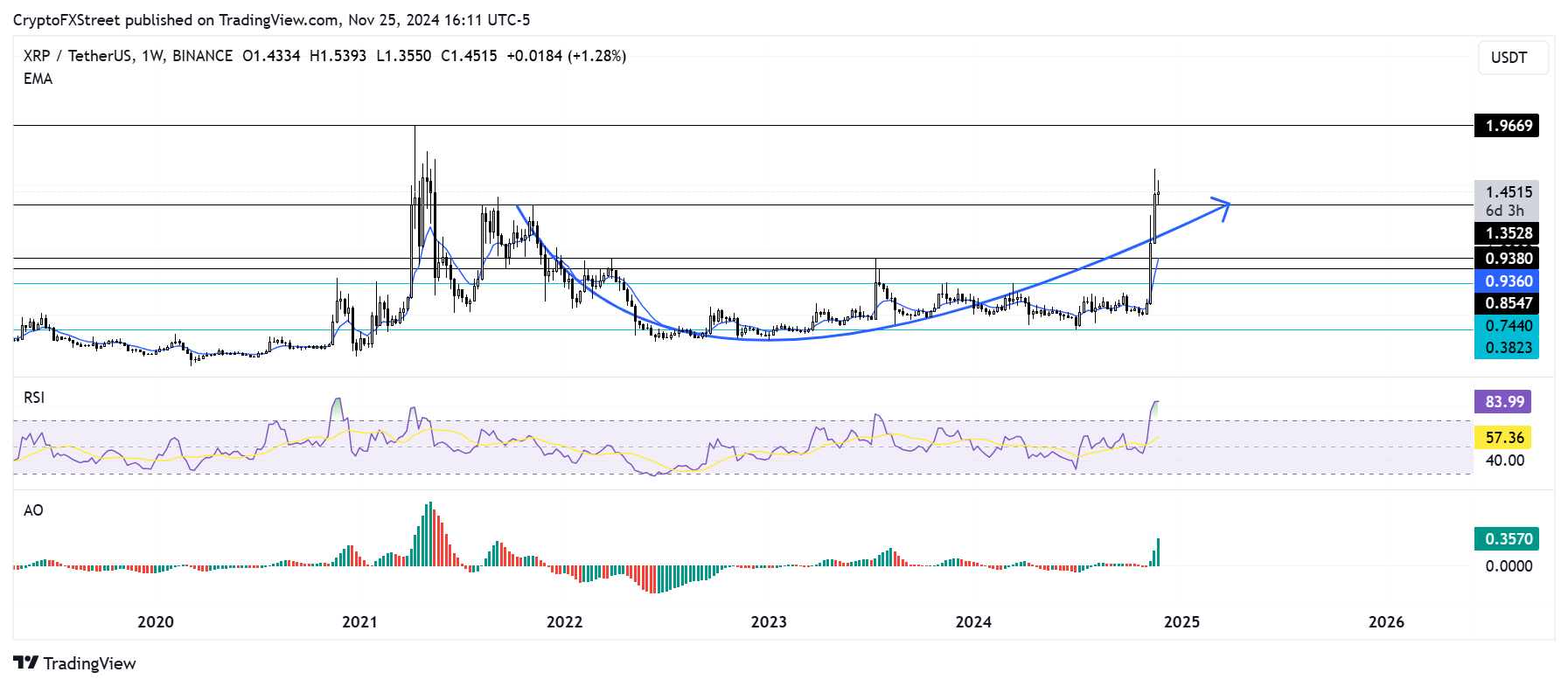Ripple's XRP quest for $1.96 strengthened by WisdomTree XRP ETF registration in the US
- Ripple's XRP surged over 7% after WisdomTree registered for XRP ETF in the US, per Eleanor Terret.
- The company recently launched a low-cost XRP ETP in Europe.
- XRP could rally toward its April 2021 resistance of $1.96 following open interest growth.
Ripple's XRP surged over 7% on Monday and aims to stage a rally toward its April 2021 high after WisdomTree registered for an XRP ETF in the US state of Delaware on Monday.
WisdomTree registers XRP ETF as issuers expect lenient regulation with Gensler gone
Global asset manager WisdomTree, with over $113 billion assets under management (AUM), registered for an XRP ETF in the US state of Delaware on Monday, according to Fox Business Eleanor Terret. With the registration confirmed, the company could file an S-1 with the Securities & Exchange Commission (SEC) soon.
The company recently launched its WisdomTree Physical XRP ETP (XRPW) in Europe, offering investors direct spot price exposure.
WisdomTree's filing now places it alongside Bitwise, 21Shares, Canary Capital and Grayscale, who have all shown interest in an XRP ETF.
The increased optimism surrounding XRP follows Donald Trump's upcoming return to the White House as US president and SEC Chair Gary Gensler's decision to retire from the agency on January 20. Most investors anticipate that Trump will appoint a new Chair who will be more lenient towards cryptocurrencies, considering his campaign promises to provide positive crypto regulations.
Meanwhile, Ripple also announced the launch of a tokenized money market fund on the XRP Ledger through a partnership with UK digital asset exchange Archax and asset manager abrdn plc.
"The fund comprises part of abrdn's £3.8 billion US dollar Liquidity Fund (Lux) fund and represents the first tokenised money market fund on the XRPL," Archax wrote in a press release.
XRP maintains momentum for rally to $1.96
XRP is up 6% after sustaining over $24 million in liquidations in the past 24 hours, per Coinglass data. Liquidated long and short positions accounted for $15.64 million and $8.49 million, respectively.
XRP maintained its rounded bottom move over the weekend and is looking to stage a move toward its April 2021 resistance of $1.96.

XRP/USDT weekly chart
The bullish outlook is strengthened by XRP's open interest, which surged to an all-time high of $2.68 billion over the weekend before a slight correction to $2.25 billion on Monday.
The Relative Strength Index (RSI) is in the overbought region and indicates prices are getting overheated.
A daily candlestick close below $1.35 will invalidate the bullish thesis and send XRP to collect liquidity at the $0.93 support level.
SEC vs Ripple lawsuit FAQs
It depends on the transaction, according to a court ruling released on July 14, 2023: For institutional investors or over-the-counter sales, XRP is a security. For retail investors who bought the token via programmatic sales on exchanges, on-demand liquidity services and other platforms, XRP is not a security.
The United States Securities & Exchange Commission (SEC) accused Ripple and its executives of raising more than $1.3 billion through an unregistered asset offering of the XRP token. While the judge ruled that programmatic sales aren’t considered securities, sales of XRP tokens to institutional investors are indeed investment contracts. In this last case, Ripple did breach the US securities law and had to pay a $125 million civil fine.
The ruling offers a partial win for both Ripple and the SEC, depending on what one looks at. Ripple gets a big win over the fact that programmatic sales aren’t considered securities, and this could bode well for the broader crypto sector as most of the assets eyed by the SEC’s crackdown are handled by decentralized entities that sold their tokens mostly to retail investors via exchange platforms, experts say. Still, the ruling doesn’t help much to answer the key question of what makes a digital asset a security, so it isn’t clear yet if this lawsuit will set precedent for other open cases that affect dozens of digital assets. Topics such as which is the right degree of decentralization to avoid the “security” label or where to draw the line between institutional and programmatic sales persist.
The SEC has stepped up its enforcement actions toward the blockchain and digital assets industry, filing charges against platforms such as Coinbase or Binance for allegedly violating the US Securities law. The SEC claims that the majority of crypto assets are securities and thus subject to strict regulation. While defendants can use parts of Ripple’s ruling in their favor, the SEC can also find reasons in it to keep its current strategy of regulation by enforcement.

